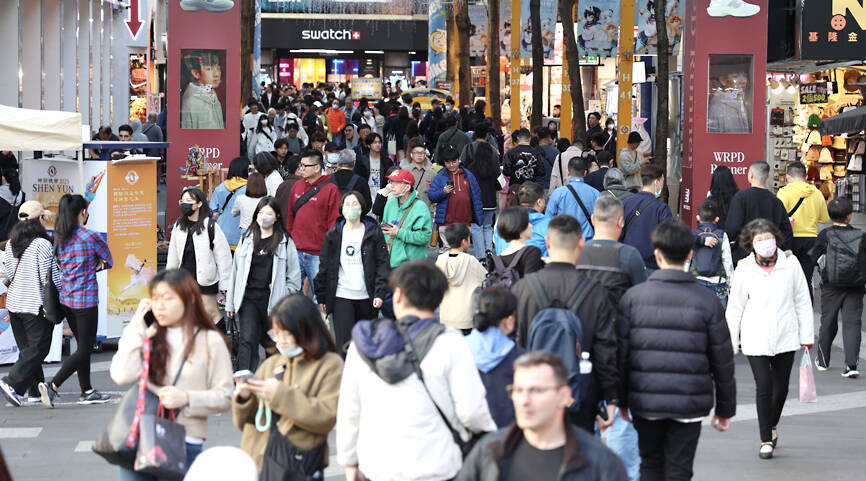Confidence in the local economy appeared mixed this month, with the index gauging current conditions rising, while another index assessing the economic outlook declined, Cathay Financial Holding Co (國泰金控) said on Thursday.
Citing a survey conducted from Feb. 1 to Feb. 7, Cathay Financial said about 29.3 percent of respondents thought the economy improved this month, while 35.7 percent felt it worsened.
That translated into an economic optimism index of about minus-6.4 this month, an improvement from minus-8.7 last month.

Photo: CNA
However, the economic optimism index for the next six months fell to minus-11.2 this month from minus-5.8 last month, following a decline in December leading indicators, the survey showed.
Amid volatility in global stock markets and US President Donald Trump’s tariff threats, the index measuring optimism toward the local stock market dropped sharply from 16.5 last month to 9.2 this month, the survey found.
Meanwhile, the index gauging the appetite for risk in the stock market increased slightly from 17.2 last month to 19.3 this month.
Cathay Financial said that 34 percent of respondents believed the tariff war could affect global trade and impact Taiwan’s economic growth, while 43.1 percent said the performance of US stock markets is expected to influence Taiwan’s equity market.
Respondents also projected GDP to grow 2.84 percent this year, with 53 percent expecting annual growth to be below 3 percent, it said, adding that it was more conservative than the Directorate-General of Budget, Accounting and Statistics’ (DGBAS) forecast of 3.29 percent.
Respondents expected growth in the local consumer price index (CPI) to reach 2.28 percent this year, with about 66 percent anticipating the CPI would average more than 2 percent for the year, above the central bank’s forecast, Cathay Financial said.
The DGBAS forecast that inflation would slow from 2.18 percent last year to 1.93 percent this year.

Intel Corp chief executive officer Lip-Bu Tan (陳立武) is expected to meet with Taiwanese suppliers next month in conjunction with the opening of the Computex Taipei trade show, supply chain sources said on Monday. The visit, the first for Tan to Taiwan since assuming his new post last month, would be aimed at enhancing Intel’s ties with suppliers in Taiwan as he attempts to help turn around the struggling US chipmaker, the sources said. Tan is to hold a banquet to celebrate Intel’s 40-year presence in Taiwan before Computex opens on May 20 and invite dozens of Taiwanese suppliers to exchange views

Application-specific integrated circuit designer Faraday Technology Corp (智原) yesterday said that although revenue this quarter would decline 30 percent from last quarter, it retained its full-year forecast of revenue growth of 100 percent. The company attributed the quarterly drop to a slowdown in customers’ production of chips using Faraday’s advanced packaging technology. The company is still confident about its revenue growth this year, given its strong “design-win” — or the projects it won to help customers design their chips, Faraday president Steve Wang (王國雍) told an online earnings conference. “The design-win this year is better than we expected. We believe we will win

Chizuko Kimura has become the first female sushi chef in the world to win a Michelin star, fulfilling a promise she made to her dying husband to continue his legacy. The 54-year-old Japanese chef regained the Michelin star her late husband, Shunei Kimura, won three years ago for their Sushi Shunei restaurant in Paris. For Shunei Kimura, the star was a dream come true. However, the joy was short-lived. He died from cancer just three months later in June 2022. He was 65. The following year, the restaurant in the heart of Montmartre lost its star rating. Chizuko Kimura insisted that the new star is still down

While China’s leaders use their economic and political might to fight US President Donald Trump’s trade war “to the end,” its army of social media soldiers are embarking on a more humorous campaign online. Trump’s tariff blitz has seen Washington and Beijing impose eye-watering duties on imports from the other, fanning a standoff between the economic superpowers that has sparked global recession fears and sent markets into a tailspin. Trump says his policy is a response to years of being “ripped off” by other countries and aims to bring manufacturing to the US, forcing companies to employ US workers. However, China’s online warriors